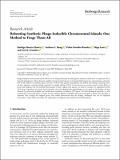Rebooting synthetic phage-inducible chromosomal islands : one method to forge them all
Date
11/05/2020Metadata
Show full item recordAbstract
Phage-inducible chromosomal islands (PICIs) are a widespread family of mobile genetic elements, which have an important role in bacterial pathogenesis. These elements mobilize among bacterial species at extremely high frequencies, representing an attractive tool for the delivery of synthetic genes. However, tools for their genetic manipulation are limited and timing consuming. Here, we have adapted a synthetic biology approach for rapidly editing of PICIs in Saccharomyces cerevisiae based on their ability to excise and integrate into the bacterial chromosome of their cognate host species. As proof of concept, we engineered several PICIs from Staphylococcus aureus and Escherichia coli and validated this methodology for the study of the biology of these elements by generating multiple and simultaneous mutations in different PICI genes. For biotechnological purposes, we also synthetically constructed PICIs as Trojan horses to deliver different CRISPR-Cas9 systems designed to either cure plasmids or eliminate cells carrying the targeted genes. Our results demonstrate that the strategy developed here can be employed universally to study PICIs and enable new approaches for diagnosis and treatment of bacterial diseases.
Citation
Ibarra-Chávez , R , Haag , A F , Dorado-Morales , P , Lasa , I & Penadés , J R 2020 , ' Rebooting synthetic phage-inducible chromosomal islands : one method to forge them all ' , BioDesign Research , vol. 2020 , 5783064 . https://doi.org/10.34133/2020/5783064
Publication
BioDesign Research
Status
Peer reviewed
ISSN
2693-1257Type
Journal article
Description
This work was supported by grants MR/M003876/1 and MR/S00940X/1 from the Medical Research Council (UK), BB/N002873/1 and BB/S003835/1 from the Biotechnology and Biological Sciences Research Council (BBSRC, UK), Wellcome Trust 201531/Z/16/Z, and ERC-ADG-2014 Proposal no. 670932 Dut-signal from EU to J.R.P. P.D-M. is a recipient of a FPI fellowship to grant BIO2014-53530-R from the Spanish Ministry of Science, Innovation and Universities. Work in the Laboratory of Microbial Pathogenesis is funded by grant BIO2017-83035-R (Agencia Española de Investigación/Fondo Europeo de Desarrollo Regional, European Union). J.R.P. is thankful to the Royal Society and the Wolfson Foundation for providing him support through a Royal Society Wolfson Fellowship.Collections
Items in the St Andrews Research Repository are protected by copyright, with all rights reserved, unless otherwise indicated.

